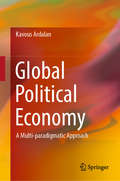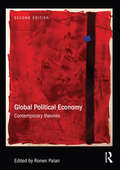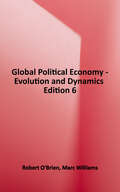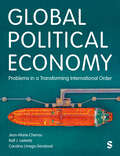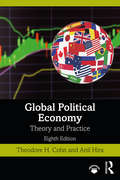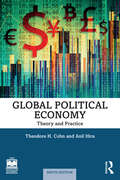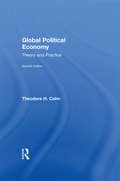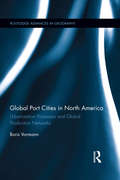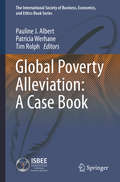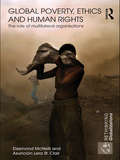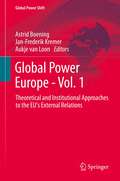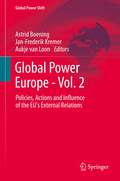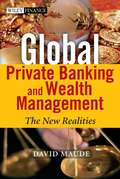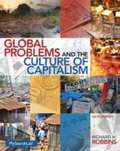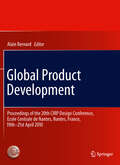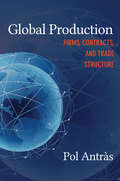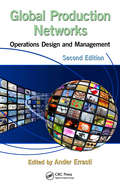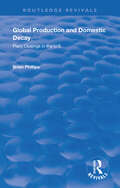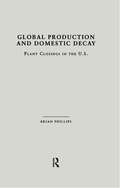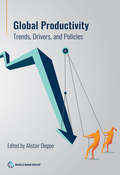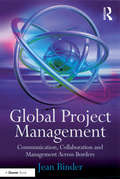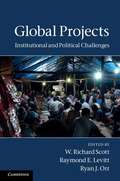- Table View
- List View
Global Political Economy: A Multi-paradigmatic Approach
by Kavous ArdalanThis book applies a multiparadigmatic philosophical frame of analysis to the global political economy. Crossing two disciplines and lines of literature—social philosophy and global political economy—this book considers seven aspects of global political economy and discusses each aspect from four diverse paradigmatic viewpoints: functionalist, interpretive, radical humanist, and radical structuralist. The four paradigms are founded upon different assumptions about the nature of social science and the nature of society. Each paradigm generates theories, concepts, and analytical tools which are different from those of other paradigms; developing an understanding of the different paradigms leads to a better understanding of the multi-faceted nature of the subject matter. In this book, the first chapter reviews the four paradigms. Each of the next seven chapters provides four paradigmatic explanations for each of the seven aspects of the global political economy. The final chapter concludes by recommending further paradigmatic diversity. This book will be of particular interest to students and researchers interested in political economy, heterodox economics, political science and international relations.
Global Political Economy: Contemporary Theories
by Ronen PalanGlobal Political Economy (GPE) is a broad and varied field of study and draws insight from a great number of fields and approaches. One of the serious problems confronting academics and students is the sheer mass of theories and debates in the field. This textbook provides up-to-date summaries of the debates and approaches that are currently at the forefront of both European and American GPE. This new revised and expanded second edition contains updated versions of most of the original chapters. In addition, there is a new section entitled ‘Emerging issues in contemporary Global Political Economy (GPE)’ and six new chapters. The second edition is structured around three themes: Part I focuses on the six central concepts of GPE: state, firm, power, labour, finance and globalization. Each one of them has been increasingly subjected to a rigorous and critical evaluation in recent scholarship. Part II covers a select number of theories and debates currently at the forefront of GPE: game theory; behavioural economics; neo-, sociological and evolutionary institutionalism; neo-Marxism; development and post-development; libidinal economies; and economic constructivism. Part III, which is new to this edition, is entitled ‘Emerging issues in contemporary Global Political Economy (GPE)’ and focuses on war, state and International Political Economy (IPE); race, gender and culture; environmental politics; and the rise of China. This is essential reading for all serious scholars and advanced students of IPE.
Global Political Economy: Evolution and Dynamics, 6th ed
by Robert O'Brien Marc WilliamsOffering an accessible introduction to both the historical roots and the contemporary dynamics of today’s world economy, the extensively revised sixth edition of this bestselling textbook continues to lead the way in equipping students with the knowledge required to make sense of the fast-paced discipline of Global Political Economy. Illustrating the breadth of the subject, the book’s authors – both highly regarded experts in the field – show how the national and international interact, while also placing an emphasis on the historical evolution of the world economy in order to appreciate the nuances of today’s economic structures. The global economy is traced from the Industrial Revolution through each phase of a shifting world order to the modern day. Then follows an engaging exploration of the dynamics of today’s economy, including trade, production, finance, labour, gender, development, the environment, security and governance. This takes into account the latest developments in the global economy, from automation and the challenges posed to the labour force to artificial intelligence and the increasingly complex global supply chains of modern transnational firms. This is the most authoritative and accessible textbook on global political economy, making it the ideal companion for students at undergraduate and postgraduate levels, on Politics, International Relations and related degrees.
Global Political Economy: Problems in a Transforming International Order
by Jean Marie Chenou Ralf Juan Leiteritz Carolina Urrego-SandovalTaking first the profound transformations underway in the global political economy, this pathbreaking new text redefines how we understand trade, finance, money and labour. In this new problem-based approach, the core concerns of the global economy are joined by key topics, spanning energy to development, inequalities to illicit economies, reflecting the fluid and dynamic nature of contemporary GPE scholarship. The book addresses four major transformations shaping the global political economy today: the questioning of the liberal international order, the rise of the Anthropocene, the technological advancements of the fourth industrial revolution, and the increasing significance of identity politics. These transformations are explored through a comprehensive framework that integrates diverse theoretical and methodological approaches, ensuring a nuanced understanding of real-world problems. Each chapter tackles key problems and global issues, from global energy dependency and rising inequality to the commodification of personal data and platform economies. The book also emphasises the need for a truly global perspective, integrating lenses, concepts, voices, and ideas from scholarship all round the world. This inclusive approach broadens understanding and reflects the complexity and diversity of the global landscape. By adopting the stance of "hybrid GPE scholars," the authors bridge the gap between different geographical and intellectual traditions, offering a rich and varied examination of contemporary GPE. Global Political Economy is an essential resource, providing a fresh and relevant perspective on the field. It fosters critical discussions and debates, encouraging readers to rethink entrenched beliefs and engage with the ever-evolving landscape of global political economy.
Global Political Economy: Problems in a Transforming International Order
by Jean Marie Chenou Ralf Juan Leiteritz Carolina Urrego-SandovalTaking first the profound transformations underway in the global political economy, this pathbreaking new text redefines how we understand trade, finance, money and labour. In this new problem-based approach, the core concerns of the global economy are joined by key topics, spanning energy to development, inequalities to illicit economies, reflecting the fluid and dynamic nature of contemporary GPE scholarship. The book addresses four major transformations shaping the global political economy today: the questioning of the liberal international order, the rise of the Anthropocene, the technological advancements of the fourth industrial revolution, and the increasing significance of identity politics. These transformations are explored through a comprehensive framework that integrates diverse theoretical and methodological approaches, ensuring a nuanced understanding of real-world problems. Each chapter tackles key problems and global issues, from global energy dependency and rising inequality to the commodification of personal data and platform economies. The book also emphasises the need for a truly global perspective, integrating lenses, concepts, voices, and ideas from scholarship all round the world. This inclusive approach broadens understanding and reflects the complexity and diversity of the global landscape. By adopting the stance of "hybrid GPE scholars," the authors bridge the gap between different geographical and intellectual traditions, offering a rich and varied examination of contemporary GPE. Global Political Economy is an essential resource, providing a fresh and relevant perspective on the field. It fosters critical discussions and debates, encouraging readers to rethink entrenched beliefs and engage with the ever-evolving landscape of global political economy.
Global Political Economy: Theory and Practice
by Anil Hira Theodore H. CohnPraised for its authoritative coverage, Global Political Economy places the study of IPE in broad theoretical context and has been updated to cover the rise of populism, Brexit, the USMCA, US–China trade wars, tariffs, refugees and global migration, the Keynesian–monetarist debate, Fordism, automation, the "gig" economy, global value chains, climate change, cryptocurrencies, and the residual effects of global economic crises and regional relationships and impacts. Written by leading IPE scholar Theodore Cohn, now joined by his prolific colleague Andy Hira, this book equally emphasizes theory and practice to provide a framework for analyzing current events and long-term developments in the global economy. This text is suitable for both introductory and advanced IPE courses. New to the Eighth Edition Expands upon the growing US–China competition in many areas of the global political economy. Discusses the problems Brexit is posing for Britain and the European Union (EU). Explores the growth of populism. Focuses more on environmental degradation/climate change along with the increase in global migration. Incorporates a new theme of South–South global economic relations. Highlights the relationship among economics, geopolitics, and security issues. Emphasizes the importance of global value chains. Looks at the potential for future global financial crises. Updates and expands the number of tables, figures, and graphics throughout. Provides an updated Test Bank and new PowerPoint slides in an Instructor’s e-Resource.
Global Political Economy: Theory and Practice
by Anil Hira Theodore H. CohnGlobal Political Economy places the study of IPE in broad theoretical context, equally emphasizing theory and practice to provide a framework for analyzing current events and long-term developments in the global economy.Andy Hira updates this essential book and the related instructor and student resources, to cover recent global developments and shifts in scholarship.New and updated for the Ninth Edition • Provides an economics primer on how markets, interest, and exchange rates work, comparative advantage, and monetary and fiscal policy; and material on getting a job in political economy.• Includes the basic tenets of realism.• Expands coverage on China, including on bipolarity/U.S. relations, security-economic tradeoffs, Taiwan, the Belt and Road Initiative, and the failure of TPP.• Discusses Russia’s invasion of Ukraine and builds on the material on sanctions.• Investigates the effects of the pandemic, including post-pandemic inflation.• Explores critical approaches to IR and different theoretical perspectives, and gives more weight to the Global South, including postcolonialism and intersectionality.• Focuses more on climate change and the environment, technological advances, and migration.• Adds material on club goods, cryptocurrencies, labor rights, global tax and offshoring, socially responsible investment, corporate social responsibility, the “Beijing Model,” the proposed global minimum tax, ASEAN, and the African Continental Free Trade Agreement.• Updates the tables, figures, graphics, references, and supplementary readings throughout.• Provides updated instructor resources including a Test Bank, PowerPoint slides, Exercises, and an Instructor’s Manual, and a new student website with practice quizzes, flashcards, lecture videos, and links to extensive additional resources including videos, podcasts, readings, and data sources to support learning and engagement.Praised for its authoritative coverage, Global Political Economy is essential reading for both introductory and advanced IPE courses.
Global Political Economy: Theory and Practice
by Theodore H. CohnPraised for its authoritative coverage, Global Political Economy places the study of international political economy (IPE) in its broadest theoretical contextnow updated to cover the continuing global economic crisis and regional relationships and impacts. This text not only helps students understand the fundamentals of how the global economy works but also encourages them to use theory to more fully grasp the connections between key issue areas like trade and development. Written by a leading IPE scholar, this text equally emphasizes theory and practice to provide a framework for analyzing current events and long-term developments in the global economy. New to the Seventh Edition Focuses on the ongoing global economic crisis and the continuing European sovereign debt crisis, along with other regional economic issues, including their implications for relationships in the global economy. Offers fuller and updated discussions of critical perspectives like feminism and environmentalism, and includes new material differentiating among the terms neomercantilism, realism, mercantilism, and economic nationalism. Updated, author-written Test Bank is provided to professors as an e-Resource on the book's Webpage.
Global Port Cities in North America: Urbanization Processes and Global Production Networks (Routledge Advances in Geography #13)
by Boris VormannAs the material anchors of globalization, North America’s global port cities channel flows of commodities, capital, and tourists. This book explores how economic globalization processes have shaped these cities' political institutions, social structures, and urban identities since the mid-1970s. Although the impacts of financialization on global cities have been widely discussed, it is curious that how the global integration of commodity chains actually happens spatially — creating a quantitatively new, global organization of production, distribution, and consumption processes — remains understudied. The book uses New York City, Los Angeles, Vancouver, and Montreal as case studies of how once-redundant spaces have been reorganized, and crucially, reinterpreted, so as to accommodate new flows of goods and people — and how, in these processes, social, environmental, and security costs of global production networks have been shifted to the public.
Global Poverty Alleviation: A Case Book
by Patricia Werhane Pauline J. Albert Tim RolphThis case book provides examples of multi-stakeholder partnerships that aim to create sustainable enterprises for both the for-profit sectors and for individuals who live in conditions of poverty. Ideal for teaching, after a brief introduction to the case method, the cases are presented as descriptions with no comments or criticisms. The cases are arranged thematically and cover a broad array of solutions in diverse countries including India, Bangladesh, Vietnam, Tanzania, the United States, South Africa, Mozambique, Peru, Ghana, Haiti,and Mexico. Specific programs for alleviating--or even eradicating--poverty through profitable partnerships come from myriad sectors such as banking, health, education, infrastructure development, environment, and technology. The cases highlight solutions that focus on bringing about substantive shifts in the conditions of life for those living in poverty.
Global Poverty, Ethics and Human Rights: The Role of Multilateral Organisations (Rethinking Globalizations)
by Desmond McNeill Asunción Lera StClairSevere poverty is one of the greatest moral challenges of our times. But what place, if any, do ethical thinking and questions of global justice have in the policies and practice of international organizations? This books examines this question in depth, based on an analysis of the two major multilateral development organizations - the World Bank and the UNDP - and two specific initiatives where poverty and ethics or human rights have been explicitly in focus: in the Inter-American Development Bank and UNESCO. The current development aid framework may be seen as seeking to make globalization work for the poor; and multilateral organizations such as these are powerful global actors, whether by virtue of their financial resources, or in their role as global norm-setting bodies and as sources of hegemonic knowledge about poverty. Drawing on their backgrounds in political economy, ethics and sociology of knowledge, as well as their inside knowledge of some of the case studies, the authors show how, despite the rhetoric, issues of ethics and human rights have – for very varying reasons and in differing ways – been effectively prevented from impinging on actual practice. Global Poverty, Ethics and Human Rights will be of interest to researchers and advanced students, as well as practitioners and activists, in the fields of international relations, development studies, and international political economy. It will also be of relevance for political philosophy, human rights, development ethics and applied ethics more generally.
Global Power Europe - Vol. 1
by Aukje Van Loon Jan-Frederik Kremer Astrid BoeningThis two-volume project provides a multi-sectoral perspective over the EU's external projections from traditional as well as critical theoretical and institutional perspectives, and is supported by numerous case studies covering the whole extent of the EU's external relations. The aim is to strive to present new approaches as well as detailed background studies in analyzing the EU as a global actor.<P><P> Volume 1: The first volume "Theoretical and Institutional Approaches to the EU's External Relations" addresses the EU's overall external post-Lisbon Treaty presence both globally and regionally (e.g. in its "neighborhood"), with a special emphasis on the EU's institutional framework. It also offers fresh and innovative theoretical approaches to understanding the EU's international position. - With a preface by Alvaro de Vasoncelos (former Director European Union Institute for Security Studies)<P> Volume 2: The second volume "Policies, Actions and Influence of the EU's External Relations", examines in both quantitative and qualitative contributions the EU's international efficacy from a political, economic and social perspective based on a plethora of its engagements.
Global Power Europe - Vol. 2
by Aukje Van Loon Jan-Frederik Kremer Astrid BoeningThis two-volume project provides a multi-sectoral perspective over the EU's external projections from traditional as well as critical theoretical and institutional perspectives, and is supported by numerous case studies covering the whole extent of the EU's external relations. The aim is to strive to present new approaches as well as detailed background studies in analyzing the EU as a global actor.<P><P> Volume 1: The first volume "Theoretical and Institutional Approaches to the EU's External Relations" addresses the EU's overall external post-Lisbon Treaty presence both globally and regionally (e.g. in its "neighborhood"), with a special emphasis on the EU's institutional framework. It also offers fresh and innovative theoretical approaches to understanding the EU's international position. - With a preface by Alvaro de Vasoncelos (former Director European Union Institute for Security Studies)<P> Volume 2: The second volume "Policies, Actions and Influence of the EU's External Relations", examines in both quantitative and qualitative contributions the EU's international efficacy from a political, economic and social perspective based on a plethora of its engagements.
Global Private Banking and Wealth Management
by David MaudeWealth management is one of the areas in which banks and other personal financial services players are investing heavily. But the market is changing fast. Going forward, players therefore need to adapt their strategies to the new realities: what worked in the past will not, for the most part, be appropriate in the future. This unique book, written by a former McKinsey consultant, offers an up-to-date, detailed, practical understanding of this exciting area of financial services.
Global Problems and the Culture of Capitalism
by Richard H. Robbins<p>Examines the development and impact of capitalist culture. <p>From its roots more than 500 years ago to the present day, capitalism expanded from Western Europe to the United States and then to much of the rest of the world. This expansion has not gone uncontested; resistance has been both direct and indirect, including political, religious, and social protest, and even revolution. How and why capitalist culture developed and the reasons why some groups resisted and continue to resist its development are among the issues explored in Global Problems and the Culture of Capitalism, 6/e.</p>
Global Problems, Smart Solutions
by Bjørn LomborgEvery four years since 2004, the Copenhagen Consensus Center has organized and hosted a high profile thought experiment about how a hypothetical extra $75 billion of development assistance money might best be spent to solve twelve of the major crises facing the world today. Collated in this specially commissioned book, a group of more than 50 experts make their cases for investment, discussing how to combat problems ranging from armed conflicts, corruption and trade barriers, to natural disasters, hunger, education and climate change. For each case, 'Alternative Perspectives' are also included to provide a critique and make other suggestions for investment. In addition, a panel of senior economists, including four Nobel Laureates, rank the attractiveness of each policy proposal in terms of its anticipated cost-benefit ratio. This thought-provoking book opens up debate, encouraging readers to come up with their own rankings and decide which solutions are smarter than others.
Global Product Development: Proceedings of the 20th CIRP Design Conference, Ecole Centrale de Nantes, Nantes, France, 19th-21st April 2010
by Alain BernardThis book of proceedings is the synthesis of all the papers, including keynotes presented during the 20th CIRP Design conference. The book is structured with respect to several topics, in fact the main topics that serve at structuring the program. For each of them, high quality papers are provided. The main topic of the conference was Global Product Development. This includes technical, organizational, informational, theoretical, environmental, performance evaluation, knowledge management, and collaborative aspects. Special sessions were related to innovation, in particular extraction of knowledge from patents.
Global Production
by Pol AntràsGlobal Production is the first book to provide a fully comprehensive overview of the complicated issues facing multinational companies and their global sourcing strategies. Few international trade transactions today are based on the exchange of finished goods; rather, the majority of transactions are dominated by sales of individual components and intermediary services. Many firms organize global production around offshoring parts, components, and services to producers in distant countries, and contracts are drawn up specific to the parties and distinct legal systems involved. Pol Antràs examines the contractual frictions that arise in the international system of production and how these frictions influence the world economy.Antràs discusses the inevitable complications that develop in contract negotiation and execution. He provides a unified framework that sheds light on the factors helping global firms determine production locations and other organizational choices. Antràs also implements a series of systematic empirical tests, based on recent data from the U.S. Customs and Census Offices, which demonstrate the relevance of contractual factors in global production decisions. Using an integrated approach, Global Production is an excellent resource for researchers, graduate students, and advanced undergraduates interested in the inner workings of international economics and trade.
Global Production Networks: Operations Design and Management, Second Edition
by Ander ErrastiThe phenomenon of globalization has increased in recent decades due to the opening of borders in Eastern Europe and the sudden emergence of other countries in the global trade economy. Yet, the process of becoming global to get access to growing markets or to achieve quality, service, and/or cost advantages from the reconfigured Value Chains is one
Global Production and Domestic Decay: Plant Closings in the U.S.
by Brian D. PhillipsFirst Published in 1942. Phillips has written an important study covering three areas: three areas: theoretical, empirical, and public policy. This book explores some of the explanations for and consequences of globalized production by transnational corporations. A review of the theoretical underpinnings of the reasons for corporate overseas expansion precedes a discussion of transnational corporation overseas production facilities. The literature reviewed supports the position that the exodus of manufacturing capital has been assisted by state policy which has encouraged capital flight, and that corporate efforts to downsize manufacturing operations in the United States have added to corporate profitability and championed profits over the strengthening the domestic economy.
Global Production and Domestic Decay: Plant Closings in the U.S. (Studies on Industrial Productivity: Selected Works)
by Brian D. PhillipsFirst Published in 1942. Phillips has written an important study covering three areas: three areas: theoretical, empirical, and public policy. This book explores some of the explanations for and consequences of globalized production by transnational corporations. A review of the theoretical underpinnings of the reasons for corporate overseas expansion precedes a discussion of transnational corporation overseas production facilities. The literature reviewed supports the position that the exodus of manufacturing capital has been assisted by state policy which has encouraged capital flight, and that corporate efforts to downsize manufacturing operations in the United States have added to corporate profitability and championed profits over the strengthening the domestic economy.
Global Productivity: Trends, Drivers, and Policies
by Alistair DieppeThe COVID-19 pandemic struck the global economy after a decade that featured a broad-based slowdown in productivity growth. Global Productivity: Trends, Drivers, and Policies presents the first comprehensive analysis of the evolution and drivers of productivity growth, examines the effects of COVID-19 on productivity, and discusses a wide range of policies needed to rekindle productivity growth. The book also provides a far-reaching data set of multiple measures of productivity for up to 164 advanced economies and emerging market and developing economies, and it introduces a new sectoral database of productivity. The World Bank has created an extraordinary book on productivity, covering a large group of countries and using a wide variety of data sources. There is an emphasis on emerging and developing economies, whereas the prior literature has concentrated on developed economies. The book seeks to understand growth patterns and quantify the role of (among other things) the reallocation of factors, technological change, and the impact of natural disasters, including the COVID-19 pandemic. This book is must-reading for specialists in emerging economies but also provides deep insights for anyone interested in economic growth and productivity. Martin Neil Baily Senior Fellow, The Brookings Institution Former Chair, U.S. President’s Council of Economic Advisers This is an important book at a critical time. As the book notes, global productivity growth had already been slowing prior to the COVID-19 pandemic and collapses with the pandemic. If we want an effective recovery, we have to understand what was driving these long-run trends. The book presents a novel global approach to examining the levels, growth rates, and drivers of productivity growth. For anyone wanting to understand or influence productivity growth, this is an essential read. Nicholas Bloom William D. Eberle Professor of Economics, Stanford University The COVID-19 pandemic hit a global economy that was already struggling with an adverse pre-existing condition—slow productivity growth. This extraordinarily valuable and timely book brings considerable new evidence that shows the broad-based, long-standing nature of the slowdown. It is comprehensive, with an exceptional focus on emerging market and developing economies. Importantly, it shows how severe disasters (of which COVID-19 is just the latest) typically harm productivity. There are no silver bullets, but the book suggests sensible strategies to improve growth prospects. John Fernald Schroders Chaired Professor of European Competitiveness and Reform and Professor of Economics, INSEAD
Global Project Finance, Human Rights and Sustainable Development
by David Ong Sheldon LeaderMany infrastructure projects around the world are funded through the project finance method, which combines private financing with public sector backing from multilateral finance institutions such as the World Bank. This examination of the theoretical and practical implications of such funding begins with a discussion of the relationship between the financial structuring of these projects and finance, policy and legal disciplines, especially in the form of investment law, human rights and environmental law. A number of case studies are then examined to provide practical insights into the application (or otherwise) of human rights and sustainable development objectives within such projects. While these theoretical perspectives do not conclude that the project finance method detracts from the application or implementation of human rights and sustainable development objectives, they do highlight the potential for the prioritisation of investment returns at the expense of human rights and environmental protection standards.
Global Project Management: Communication, Collaboration and Management Across Borders
by Jean BinderGlobal Project Management describes how to adapt your organisation and your projects to thrive in business environments which require distributed skills, around-the-clock operations and virtual team environments. The book goes beyond simple recommendations on collaborative tools, to suggest the development of best practices on cross-cultural team management and global communication, recommend organisational changes and project structures, and propose alternatives for the implementation of the new practices and methods. Filled with real-life examples and techniques, the book illustrates how to apply the recommendations as part of the successful management of any global project.
Global Projects
by W. Richard Scott Raymond E. Levitt Ryan J. OrrAn analysis of the institutional and social movement processes that surround global infrastructure projects.
